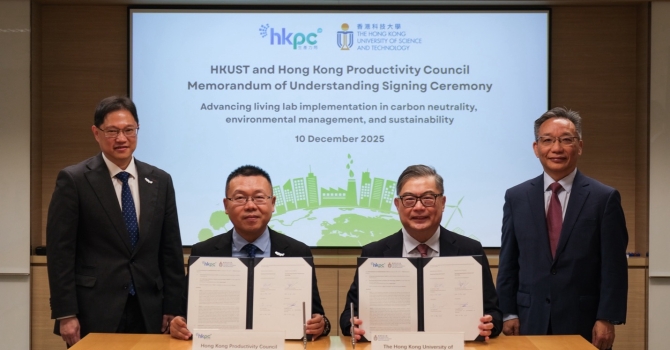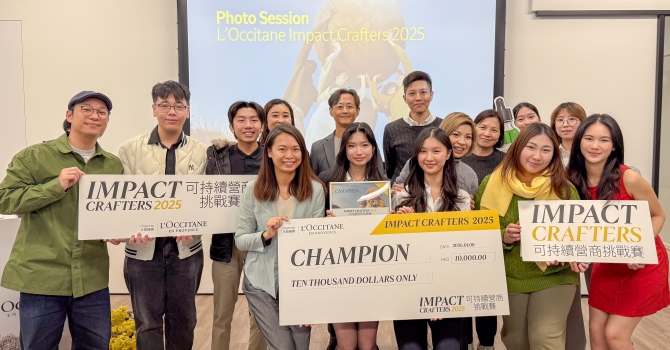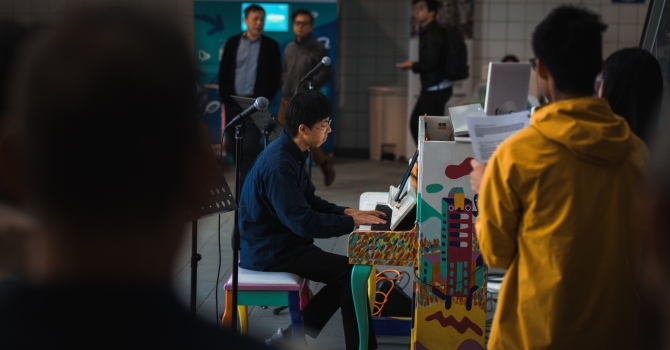HKUST and French Companies Sign MoU to Collaborate on Low Carbon Retrofit Pilot Project
On 12 September, HKUST was excited to sign a Memorandum of Understanding (MoU) with a consortium of French companies—Schneider Electric Hong Kong, Veolia, Bouygues-Dragages, Egis, and Saint-Gobain—to launch a pioneering low-carbon retrofit pilot project. This initiative marks a key step toward Hong Kong’s carbon neutrality goal by 2050, aligned with France’s commitment to sustainability.
The pilot will focus on energy-efficient retrofitting of an existing HKUST campus building, serving as a living laboratory for advanced technologies, innovative financing models, and data-driven insights to inform policy and guide future decarbonization efforts.
Prof. Kar Yan TAM, HKUST Vice President for Administration and Business, highlighted the collaboration: “Retrofitting is not just good for the planet. It’s good for business. By working closely with industry partners, we aim to generate real-world data, performance benchmarks, and insights that can inform policy, guide investment, and unlock scalable solutions.”
This partnership will launch a pioneering low carbon retrofit pilot project, marking a pivotal step toward achieving Hong Kong's carbon neutrality goal by 2050, a goal shared by France.
Key project features include:
- Joint Assessments: Evaluate and identify retrofitting opportunities within the HKUST campus buildings to estimate energy-saving potential.
- Capacity Building: Raise awareness about retrofitting as a key decarbonisation strategy by sharing results and best practices with industry and government.
- Develop data-driven policy: Utilize advanced digital tools to assess energy-saving measures and support policy frameworks and incentive schemes in Hong Kong
- Technology Adoption: Showcase innovative energy management technologies to enhance energy and operational efficiency.
- Living Laboratory: Create experiential learning opportunities and test research-driven solutions to address sustainability challenges.
The signing ceremony of the MOU took place at the Hong Kong Convention and Exhibition Centre. The MOU was signed by the Vice President for Administration and Business of the HKUST, Prof. TAM Kar-Yan; the President of Schneider Electric Hong Kong, Mr. Jonathan CHIU; and the Chief Executive Officer of Veolia Hong Kong and Macau, Mr. Laurent PELLETIER. The signing ceremony was witnessed by the French Ambassador to China, Mr. Bertrand LORTHOLARY; the Consul-General of France in Hong Kong and Macau, Ms. Christile DRULHE; the Director-General of Investment Promotion of InvestHK, Ms. Alpha LAU; and Associate Director-General of Investment Promotion of InvestHK Mr. Arnold LAU.
"French companies have always been at the forefront of innovation when it comes to sustainable infrastructure. We are proud to support them in bringing their advanced, green solutions to Hong Kong's dynamic built environment. As our two territories share the same goal of reaching carbon neutrality by 2050, this pilot project demonstrates how France and Hong Kong are natural partners to build a greener, more resilient future, in line with the roadmap agreed between our two Presidents to strengthen our co-operation to promote sustainable development and environment protection while addressing the challenges of climate change," Mr. Lortholary said.
"This pilot project is not only about sustainability, but also about market creation and investment facilitation," said Ms Lau. "With over 90 per cent of Hong Kong's existing buildings expected to still be in use by 2050, the retrofitting sector represents a significant opportunity for investment, innovation, and job creation. We are pleased to have facilitated this initiative by connecting strategic partners and enabling collaboration. InvestHK is committed to supporting companies of all sizes and sectors as they expand in Hong Kong, strengthen their regional presence, and turn innovative ideas into commercially viable opportunities."
By showcasing innovative financing models and advanced retrofitting technologies, this first HKUST pilot aims to pave the way for broader adoption of similar projects.



